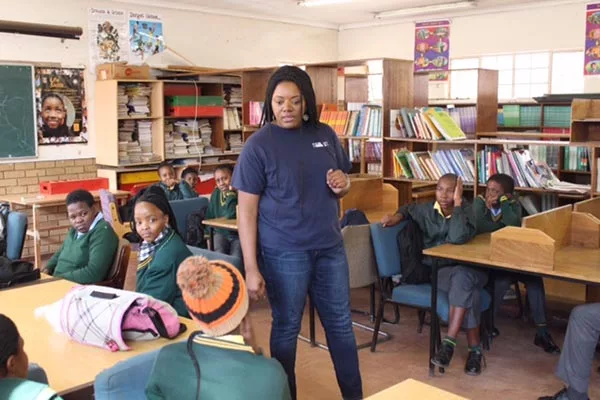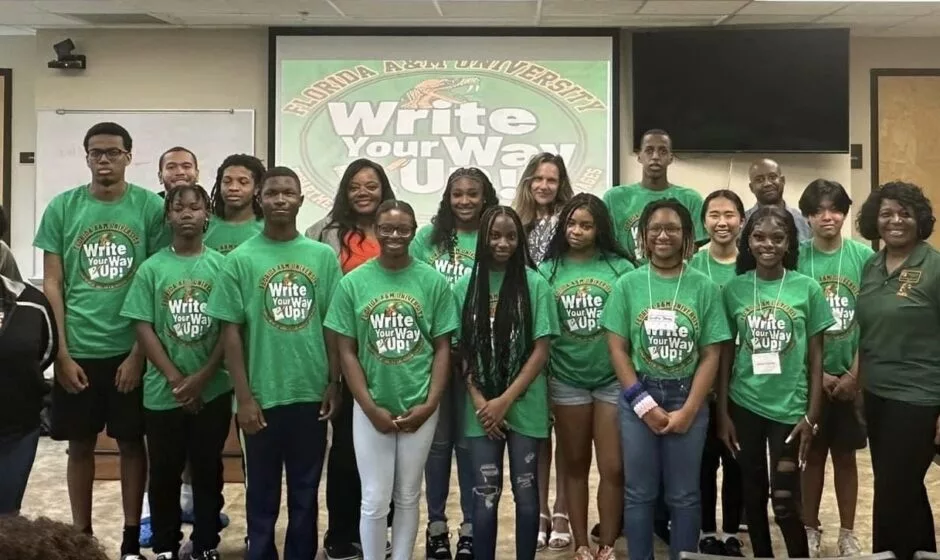Leveraging HBCU experience to make peace in a time of upheaval
Kendra L. Mitchell
Professor, Director of Composition, and Fulbright Program Adviser
2016 Fulbright English Language Teaching Assistant to South Africa

Dr. Kendra L. Mitchell is director of composition and assistant professor of English at Florida A&M University (FAMU), a public, historically Black university located in Tallahassee. She has taught composition, literature, and historical linguistics. Additionally, she has been a leader on campus developing tutor education programs, chairing campus-wide committees for incoming first-year students, and coordinating curriculum. One of the roles she is most excited about is being a Fulbright Program Adviser, helping to connect FAMU students with Fulbright opportunities and guide them through the application process.
Dr. Mitchell, who graduated from FAMU before earning a Master’s and a Ph.D. from Florida State University, was on the other side of the adviser’s desk less than a decade ago. She knows just how pivotal the Fulbright experience can be. In 2016, she served as a Fulbright English Teaching Assistant to South Africa, where she was a guest lecturer in the Faculty of Education at the University of Pretoria.
It was as a Fulbrighter that she honed her ability to harness empathy as a resource to mitigate racial, cultural, and socioeconomic divides in the classroom that were driven by national student protests.
She vividly recalls a moment when she was teaching a course on multiculturalism, during a period of social unrest. She had her phone out on the table in case she got a call saying they needed to evacuate the building. She understood that the students had “big feelings” about what was going on in their schools and in their nation. Dr. Mitchell realized that she “had the opportunity to bridge the gap in a way that I didn’t know I could, through empathy.”
Dr. Mitchell leveraged her experiences as an HBCU alum to help the students begin to see one another’s point of view. “I knew what it felt like to be othered. I knew what it felt like to be unheard, but I also knew what it felt like to make others understand my perspective and my point of view with different and creative methods.”
Some of her students assumed that everything had been easy for her as an American, and that she didn’t understand oppression or what it was like to be left out of a conversation and not be considered in decisions. But when she shared her personal stories and African-American history “they listened with a different ear.”
Even students with more advantages listened differently and became willing to consider equity and education in ways that they hadn’t considered before. She says, “It was a privilege for me to be able to bridge those gaps through those past experiences.”
“In a time of upheaval and unrest, we left with peace.”



Dr. Mitchell feels that the Fulbright experience in South Africa gave her research a broader, global context and led to what she calls “the professionalizing of myself.” It accelerated opportunities to lead initiatives and invitations to talk to ambassadors and other leaders. Fulbright staff at the U.S. Embassy helped draw out her leadership abilities in a unique way. “It allowed me to take risks because the people who chose me trusted me. They saw that I was an HBCU graduate, and they said, ‘Hey, we want you to talk about those experiences.’”
That Fulbright experience has been useful in her teaching and advising career back at FAMU, helping her to encourage her students to be open to different views. She has learned to say, “Hey, you know, I can’t change your mind, but I can ask you to turn your head and swivel and see another perspective, and then maybe your feet will follow.”
As a Fulbright Program Adviser at FAMU since 2018, she has increased student awareness of Fulbright opportunities, and helped strengthen the engagement with the Fulbright Program that has led to FAMU’s recognition as a Fulbright HBCU Institutional Leader. And most recently, she has volunteered to be a Fulbright Program Adviser Mentor, eager to share her knowledge with early career FPAs at other colleges and universities.
For the National Council for Teachers of English, Dr. Mitchell was elected to the executive committee of the Conference on College Composition and Communication. Her scholarship on writing centers can be found in the Writing Center Journal, Praxis Journal, and several book collections. Together with a colleague from the writing center at Jackson State University, Dr. Wonderful Faison, she has co-edited a forthcoming collection of scholarship on HBCU writing centers, titled Makin’ A Way Outta No Way: HBCUs, Writing Centers, & Antiracism. The editors aim to inspire critical curiosity about HBCUs as valuable contributors to writing center studies.